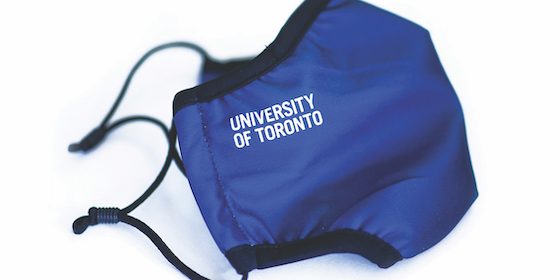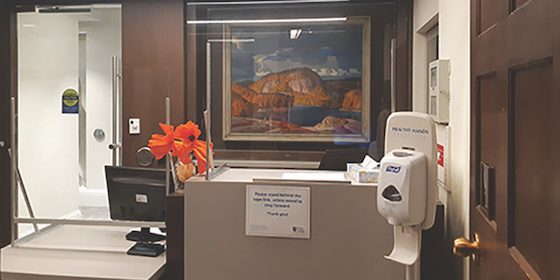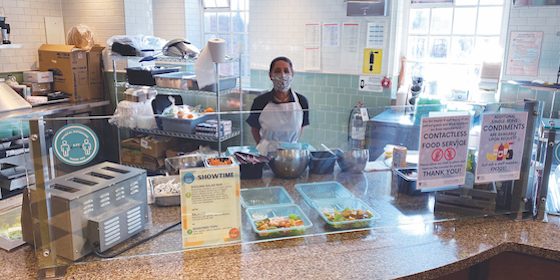Nota bene – COVID-19 and the Trinity community
A very different back-to-school experience
By Jennifer Matthews
On September 10, a new academic year began at Trinity College. It was, however, anything but a typical beginning. The Trinity campus officially closed in March due to the COVID-19 pandemic and remains closed to the public. Only members of the Trinity community who need to be on campus are permitted, and all in-person events have been cancelled, postponed, or are being delivered virtually.
But while the physical campus may feel strangely quiet, there is a world of activity, connection and learning taking place online this fall. Roughly 85 per cent of classes are being delivered entirely online, with the remainder being taught as “dual delivery,” with some students attending in person in classrooms arranged for physical distancing while the remainder of the students join online. Some students are living in residence, with significant measures in place to protect their health. “Although it’s challenging in so many ways for everyone, our students, faculty and staff have adapted remarkably well to this temporary reality,” says Provost Mayo Moran.
Online orientation
For the class of 2024, the Trinity experience began with a new virtual orientation program delivered via “the Trinternet” in August, followed by Trinity Orientation Week from Sept. 6-12. Incoming students were able to learn more about the College through videos as well as online interactions with upper-year student mentors and each other. Orientation included live online social events, academic and student life sessions, a virtual clubs fair, and even a newly envisioned version of the College’s traditional Matriculation ceremony. For students living in residence, their online connection was supplemented by socially distanced in-person activities for small groups, from a trivia night in Seeley Hall to a tour of the Provost’s Lodge.
Hybrid learning model
While the majority of classes are online, approximately 15 percent of Trinity’s courses have an in-person option. Classrooms have been reconfigured for physical distancing and technology upgrades have been put in place to enable remote learning. Faculty have worked hard to reimagine their courses and to find ways to engage students virtually using online tools to facilitate seminar conversations and connect students learning online and in-person. Faculty will provide individualized student support through office hours, either online or in person where physical distancing permits. Faculty and staff are also planning virtual co-curricular events, including speaker events and online discussions, to foster a sense of academic community.
Protective measures for all
Members of the Trinity staff team worked throughout the summer with U of T on preparedness planning, following a process that complies with government and public health directives and university guidelines. As Trinity also has distinctive needs, early on the College established a Re-Start Steering Committee and Working Groups (Academic Services, Residential Services, Food Services, and Operations/Administration). They liaise with relevant groups from across U of T to update health and safety measures as needed.
The College’s buildings remain closed to the public and visitors, and those who are permitted on campus are always required to wear non-medical masks or face coverings while indoors or in common-use spaces on campus. In late August, all Trinity students, staff and faculty were provided with two free U of T non-medical masks. Physical distancing measures are in effect across the College as well, with signs indicating maximum space occupancies for spaces, and reconfigured furniture in classrooms and common spaces. Dedicated entrances, exits and signs encourage a one-way flow of traffic. There are new sanitizing stations across campus and supplies are available in public and private spaces so that individuals can wipe down their own workstation and seating area.
The College has also increased cleaning and disinfecting protocols in high-traffic and public areas and upgraded heating and ventilation systems where necessary. In high-traffic areas where it is difficult to maintain physical distancing, there are physical barriers.
Supporting students
Staff who provide essential services, including members of the Office of the Dean of Students, and Welcome Desk and Facility Services staff, have been on campus throughout the summer. Although many staff and faculty will continue to work remotely over the fall term, in the reconfigured Student Services Centre staff from both the Office of the Dean of Students and the Registrar’s Office are offering in-person and online services including academic, personal, career and financial advising. The John W. Graham Library is providing access to library materials through curbside pickup options, with strict protocols for the quarantining of returned materials. Trinity’s wide range of academic services, including our Academic Dons, Learning Strategist, Writing Centre, Math Aid Centre, and Personal Librarian Program are available to students virtually.
Residence
Since March, the College has been housing a small group of students in residence who were unable to return home. In addition to those students, approximately 200 new and returning students (around 40 per cent of normal capacity) have moved into residence. Safety measures include single-occupancy rooms, distribution of occupants across Trinity and St. Hilda’s buildings, and outdoor social spaces. Additional common rooms, with occupancy limits and public health restrictions, have also been created out of empty larger rooms. All students arriving in residence were asked to self-screen for COVID-19 test results, and those arriving from outside Canada were required to quarantine for 14 days prior to moving in to residence (U of T offered quarantine accommodations for those individuals who needed them).
While the residence experience may not be the same this year, Trinity’s excellent Academic Dons and Community Advisors (CAs) completed additional training in August and are leading small, masked, physically distant, in-person activities to help foster a sense of community. Community Wellness programming includes virtual office hours, online social hangouts with student wellness assistants, and online wellness workshops—plant potting, for example—with kits delivered to residence rooms so that students can participate virtually.
Food services
Students living in residence and members of the Trinity community who need to be on campus have access to high quality, nutritious food, prepared in Strachan Hall and the Buttery using additional safety and sustainability measures. Masks are required when moving in common areas, with socially distanced seating available indoors and outdoors. Students are also permitted to return to their residence rooms with food if they wish. Meal plans have been changed to a declining cash balance model (vs. the all-you-can-eat-for-one-price model), with daily offerings listed online. The College has also launched a new “Eco-to-Go” program, which allows students to take food out of the dining outlets using a reusable, BPA-free plastic container. Containers are returned after use, to be washed by the Food Services team.
Ready to adapt
Life may feel very different right now, but the College’s teams are united in their commitment to the health and well-being of the Trinity community, to academic excellence, and to offering an outstanding student experience. And of course, they are prepared to adapt—as they have over the past several months—to changes in pandemic protocols. For the latest updates on the College and COVID-19, please visit trinity.utoronto.ca
As published in Trinity Magazine Fall 2020




Sorry, comments are closed for this post.